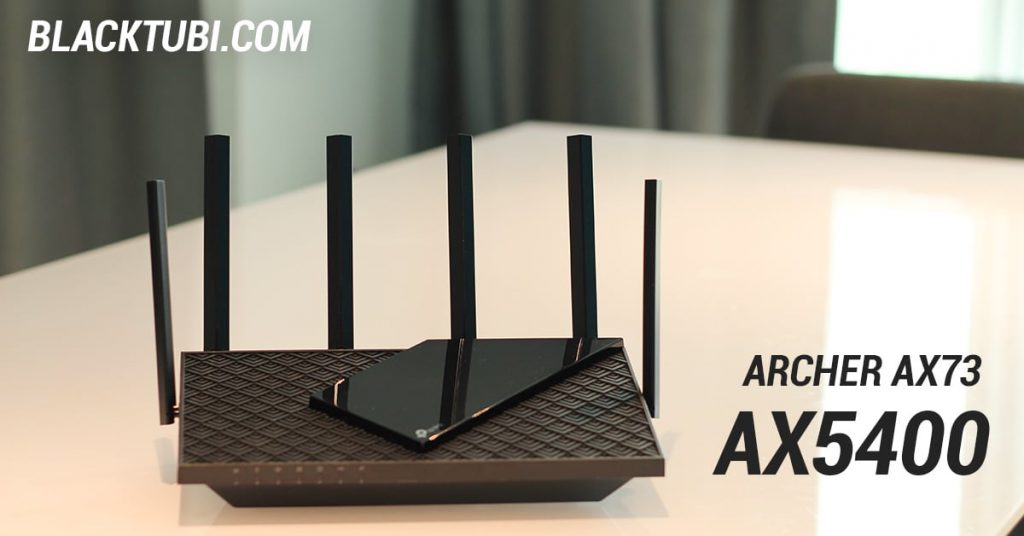
It’s 2021 and the pandemic is still here. This means we’re still working from home until things get better. Having a reliable and fast WiFi connection is crucial for work productivity. Thus, that brings us to the new TP-Link Archer AX73, a high-performance AX5400 wireless router now available in Malaysia.
The Archer AX73 is a high-performance WiFi 6 router. It can support total WiFi link speed up to 5400Mbps with dual-band configuration. In fact, the router supported the 160Mhz mode which means the 5Ghz WiFi network can get really fast if you have a 160Mhz supported WiFi adapter.
What’s so good about the Archer AX73 is the price. It is available for sale at just RM399 in Malaysia with a 3 years one-to-one exchange hardware warranty and after sales support from TP-Link Malaysia.
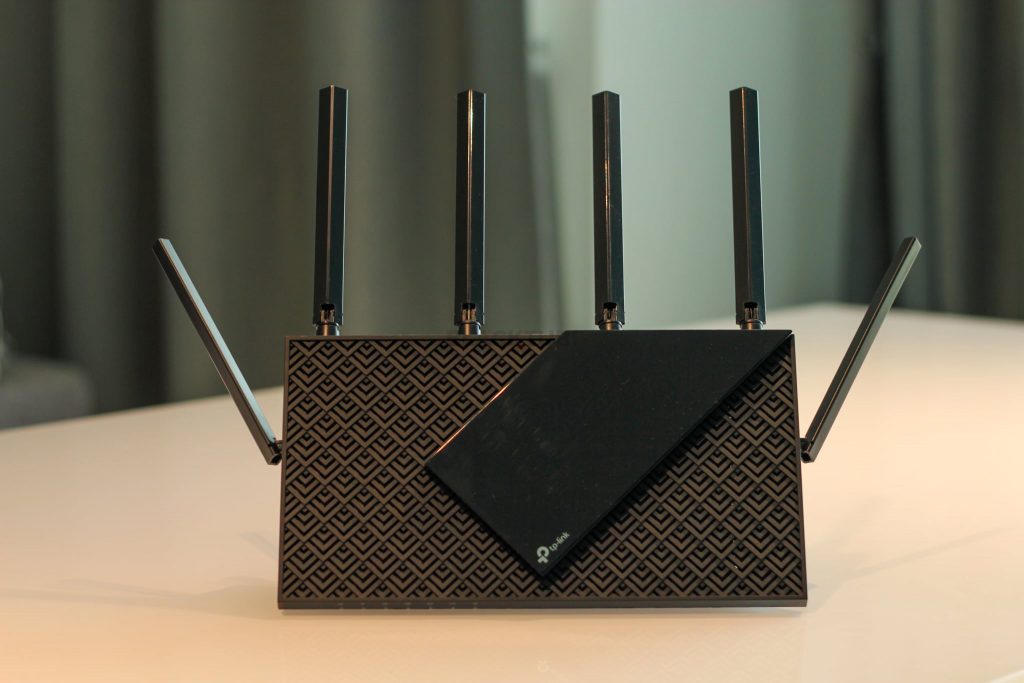
Table of Contents
The first thing that you’ll notice from the Archer AX73 is the 6 antennas. These antennas are real and not just for show. We’ve taken apart router and identified that 4 antennas are used for the 5Ghz network and 2 antennas are used for the 2.4Ghz network.
The reason why there are 6 antennas is because the Archer AX73 uses an individual antenna for each transmit channel rather than combining both the 2.4Ghz and 5Ghz into a single antenna. Rather than using a dual-band antenna, each antennas on the router are optimized for their desired frequency, resulting in better performance without compromises.
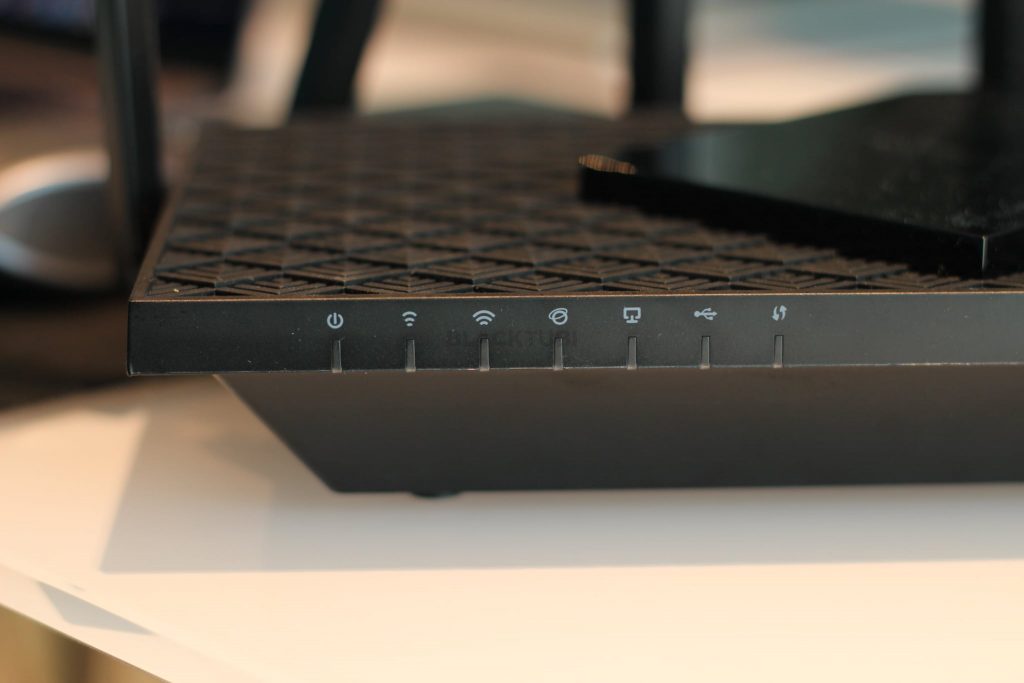
The Archer AX73 also runs really cool and stable in our test. It’s because TP-Link used a much larger heatsink and added more ventilation. This is why the Archer AX73 is so big and heavy! In fact, it barely heats up even on prolonged stress test and certainly much cooler than the infamous Archer AX50.
Hardware and Specs
| Wireless 2.4Ghz | Wi-Fi 6 up to 574Mbps (40Mhz 2X2) |
| Wireless 5Ghz | Wi-Fi 6 up to 4804Mbps (160Mhz 4X4) |
| WiFi Features | OFDMA, MU-MIMO, Beamforming, WPA3, OneMesh |
| CPU | Broadcom BCM6750 1.5Ghz Triple-Core |
| Ethernet Ports | 1x Gigabit WAN port + 4x Gigabit LAN port |
| USB | 1x USB 3.0 port |
The Archer AX73 is powered by a fast Broadcom 1.5Ghz Triple-Core CPU and comes with 512MB RAM. TP-Link says this router can actually support up to 200 devices connected simultaneously. While I don’t have 200 devices to test, the router do work realiably in my home with close to 50 devices connected to it.
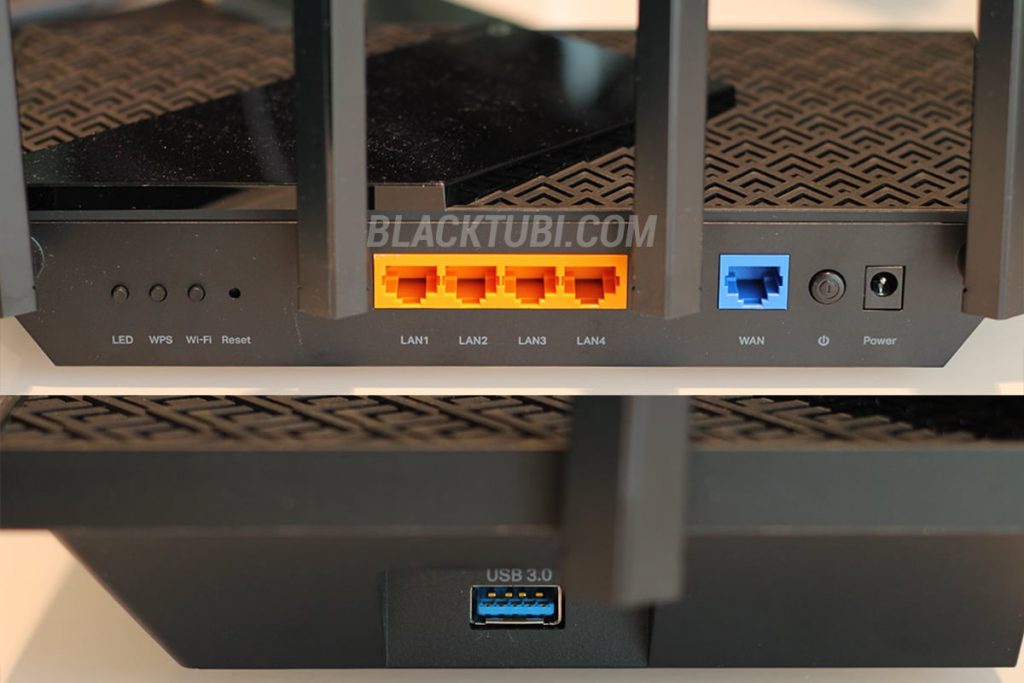
Connectivity wise, the router comes with 4 Gigabit Ethernet LAN ports and a single Gigabit Ethernet WAN port. It also comes with a USB 3.0 port which can be used for file sharing and printer sharing to devices connected to the wireless router. The LED status indicator on the router can be disabled if needed.
Unboxing Archer AX73
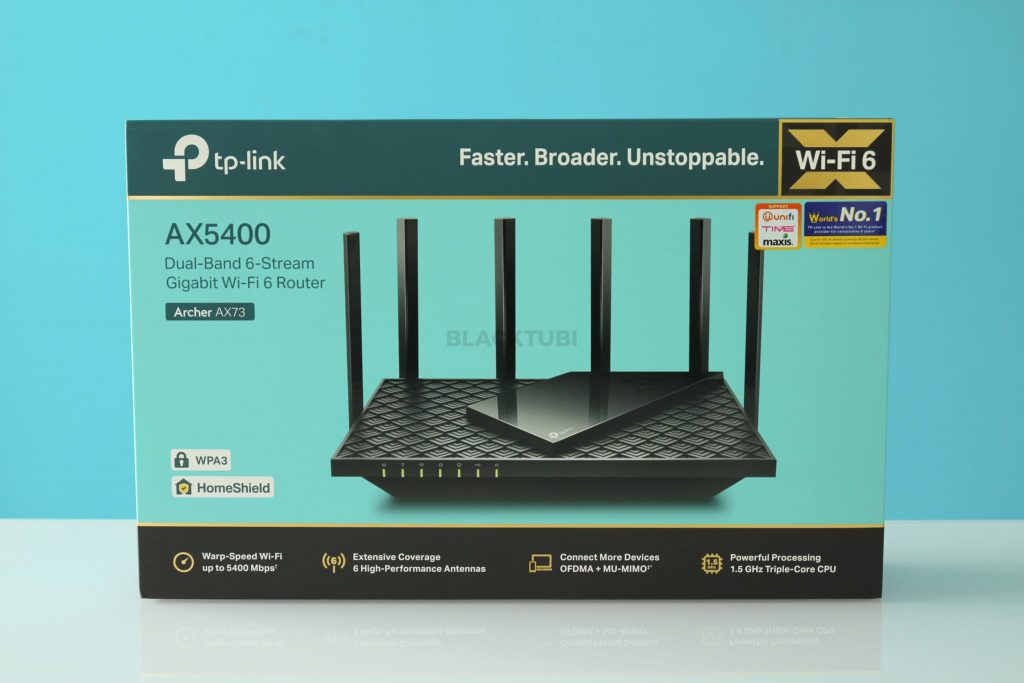
The box of Archer AX73 for Malaysia market comes labeled with support for TM Unifi, Maxis Fibre and TIME Fibre.
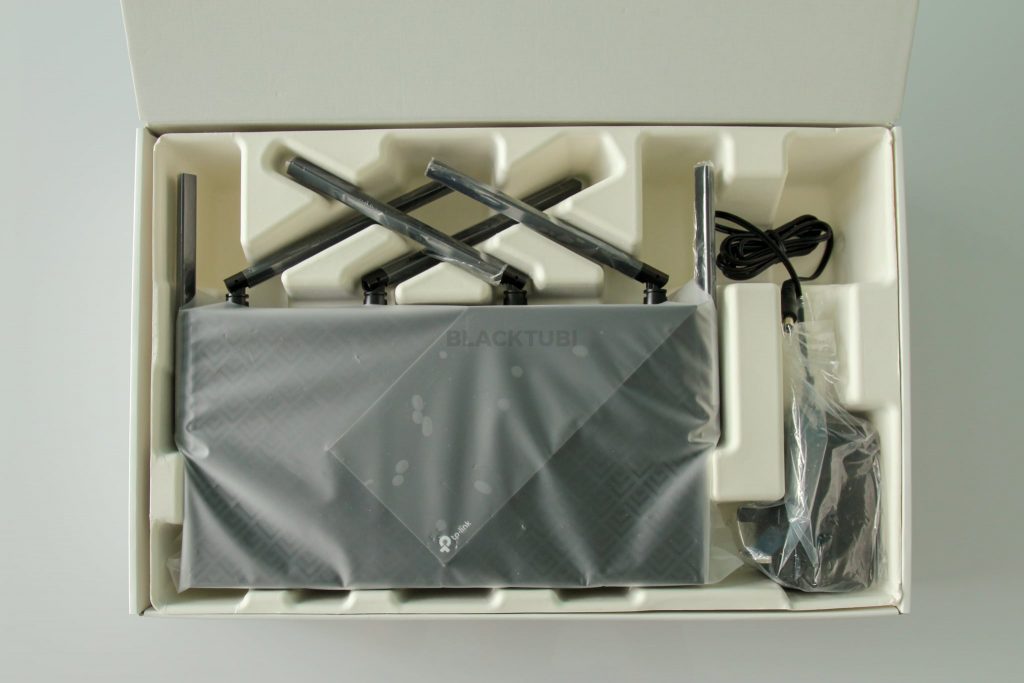
Each antenna on router and accessories are individually wrapped. The cardboard box also provide sufficient protection during shipping. It comes with a CAT5E Gigabit Ethernet LAN cable and a 12V power adapter.
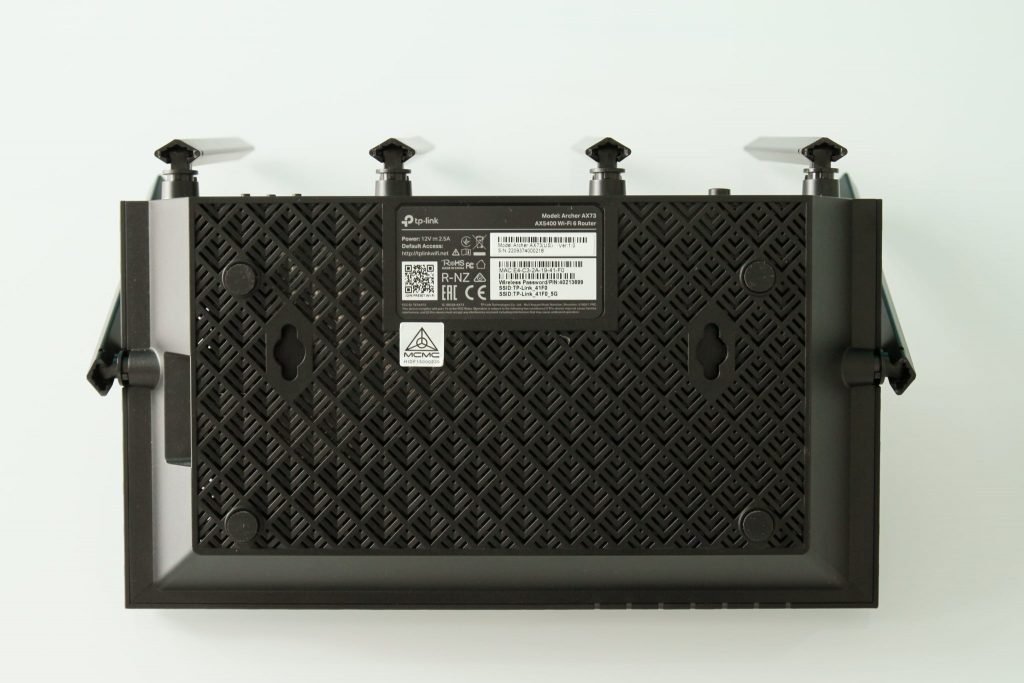
It is possible to wall-mount the wireless router with 2 mounting holes behind the product. The default WiFi name and password is also labeled on the back of the router. Similar to the top, the entire bottom of the product is full of ventilation holes for enhanced cooling performance.
Quick Teardown
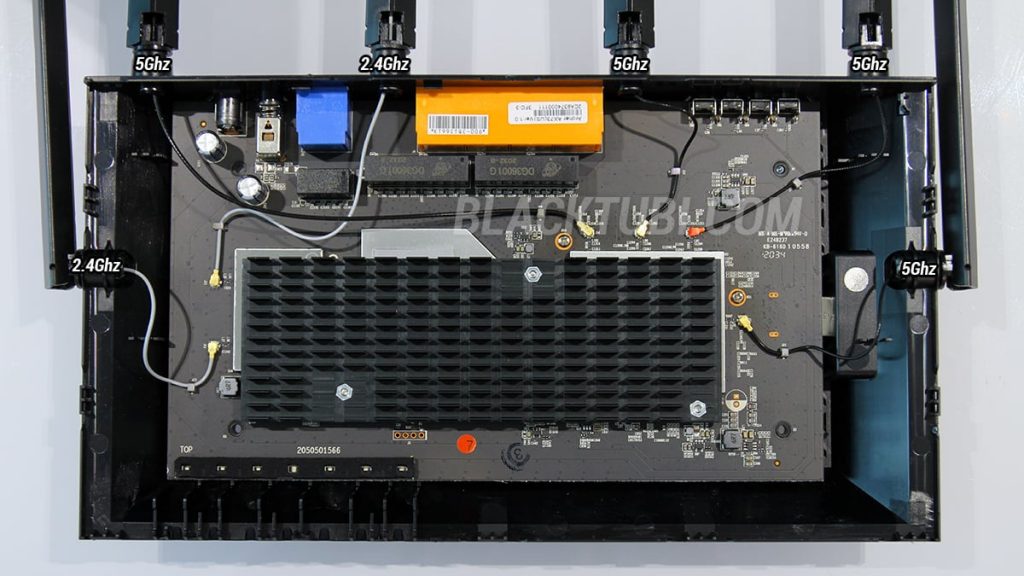
I also did a simple teardown for the Archer AX73. Since I am not a hardware enginee, I won’t comment much about this. WiFi related components are shielded and there’s a decent sized heatsink to cool down the router. This explains why this router barely heats up.
Wi-Fi Performance
With the beefy specifications, let’s see if that actually transfer into actual performance in our benchmark test. I will be using a laptop with the Intel AX200 wireless adapter and an iPhone to test the 5Ghz Wi-Fi 6 performance of TP-Link Archer AX73. I will be skipping the 2.4Ghz result as it is probably irrelevant these days given how congested is the 2.4Ghz channel.
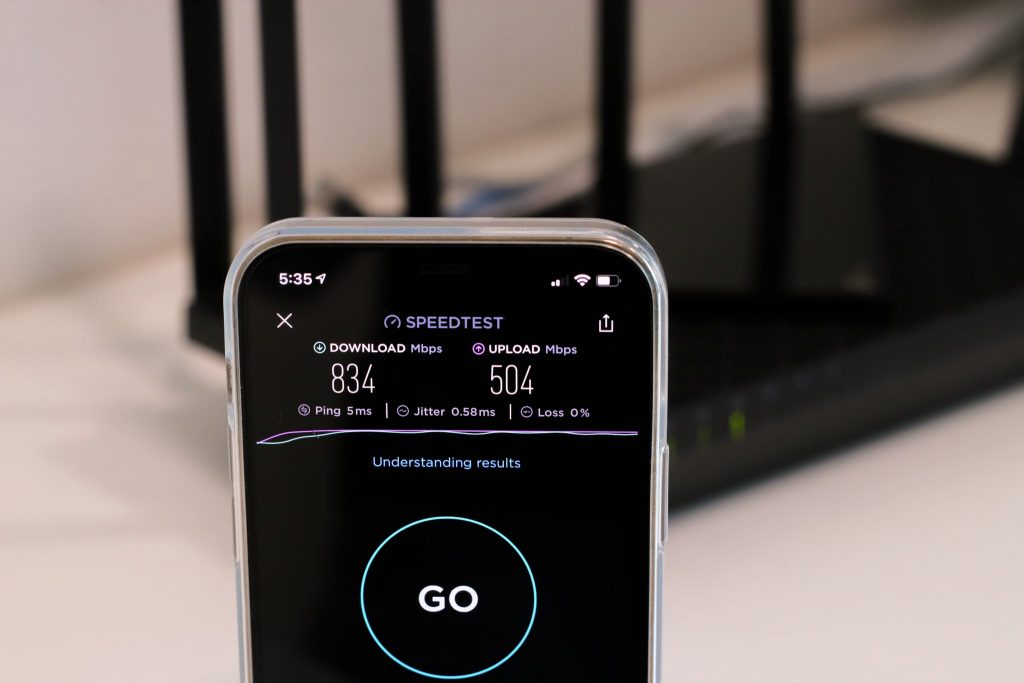
At short distance to the router, my iPhone can achieve over 800Mbps on the 5Ghz Wi-Fi network. This is not surprising considering most Wi-Fi 6 routers, even the budget models like Archer AX10 can deliver such performance. What we really want to know is the long range signal coverage and performance.
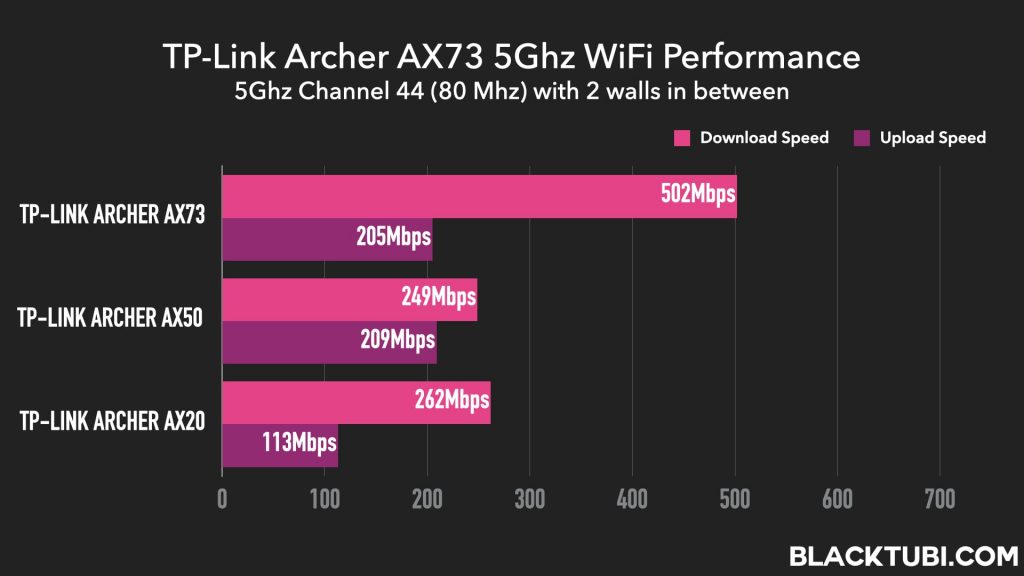
The 5Ghz signal on the Archer AX73 is really strong! The 5Ghz coverage and performance is faster and stronger than every single AX3000 wireless router that we’ve tested on this site. The performance is also stable and consistently replicable througout our review.
Security wise, it can support the latest WPA3 security right out of the box. However, I do not recommend using WPA3 as older WiFi devices may face compatibility issues. Considering a router last many years, you can consider enabling it few more years in the future as older devices are phased out from your home.
Firmware and Features
TP-Link maintain their philosophy of not overly bloating the firmware with features and I think it works here. Reliability is the keyword here as I find the Archer AX73 firmware is very well optimized. During my test, I do not face any issues with the router. The firmware always responded fast consistently.
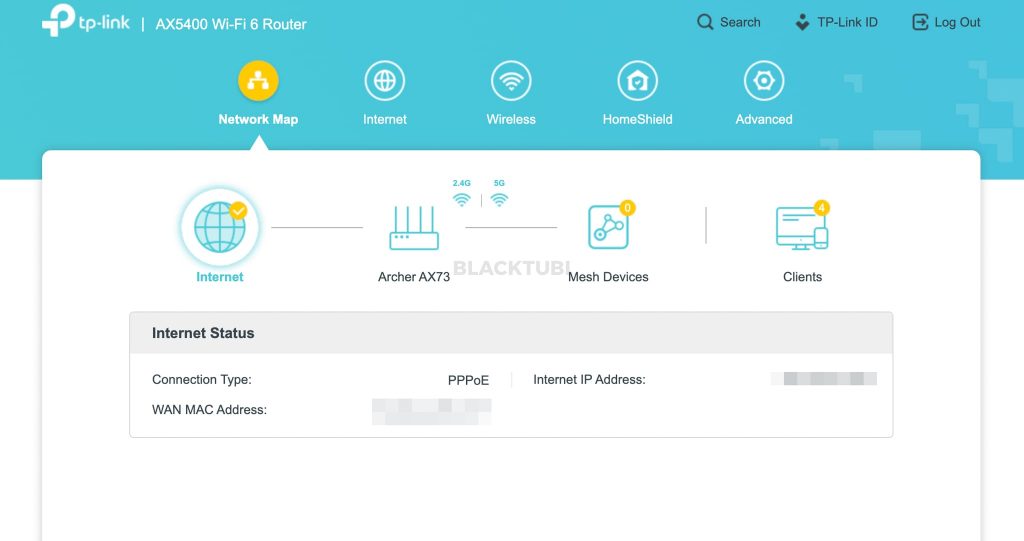
The web interface is simple to operate and certainly very easy to setup the router. It can support TM Unifi, Maxis Fibre and all ISPs in Malaysia. For most users, it will involve connecting the router to the modem and use the setup wizard on the interface. The VLAN profile must be selected for TM Unifi or Maxis Fibre users in Malaysia.
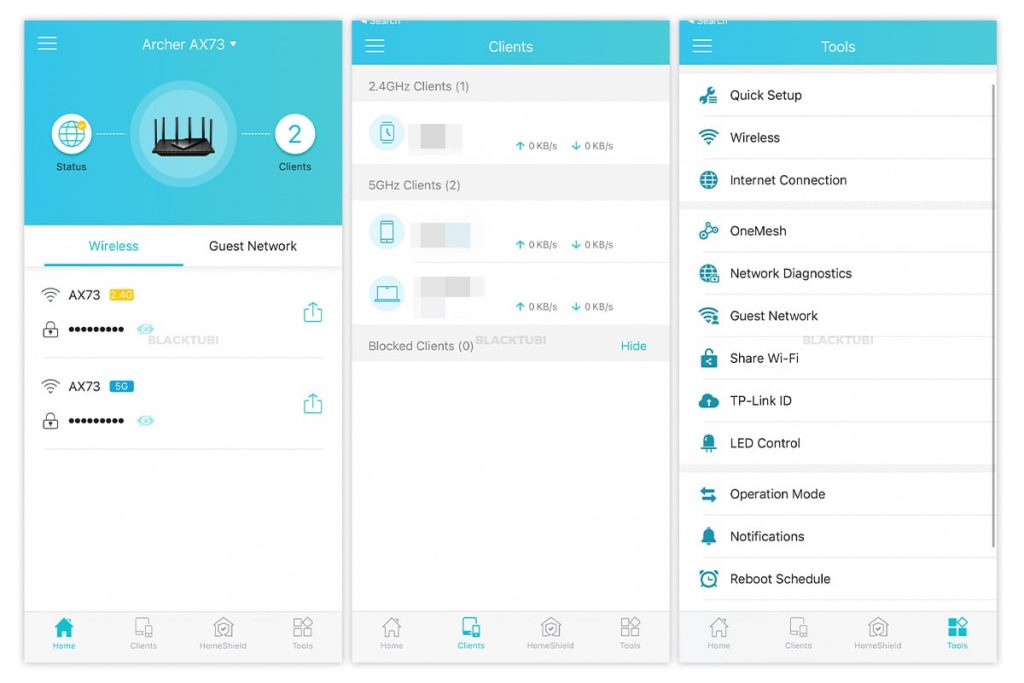
TP-Link Tether app offers a quick overview of your home network condition such as connected devices and network speed. The app is well designed and really responsive in our test. It is securely linked to TP-Link cloud and authenticated with your personal TP-Link account. TP-Link HomeShield security feature is only accessible on the app as well.
TP-Link HomeShield Security
TP-Link HomeShield is their new commercial grade firewall replacing the previous HomeCare feature. It can protect your devices from accessing a malicious website containing a virus or malware with an advanced antivirus firewall. This feature is now powered by Avira Antivirus database.
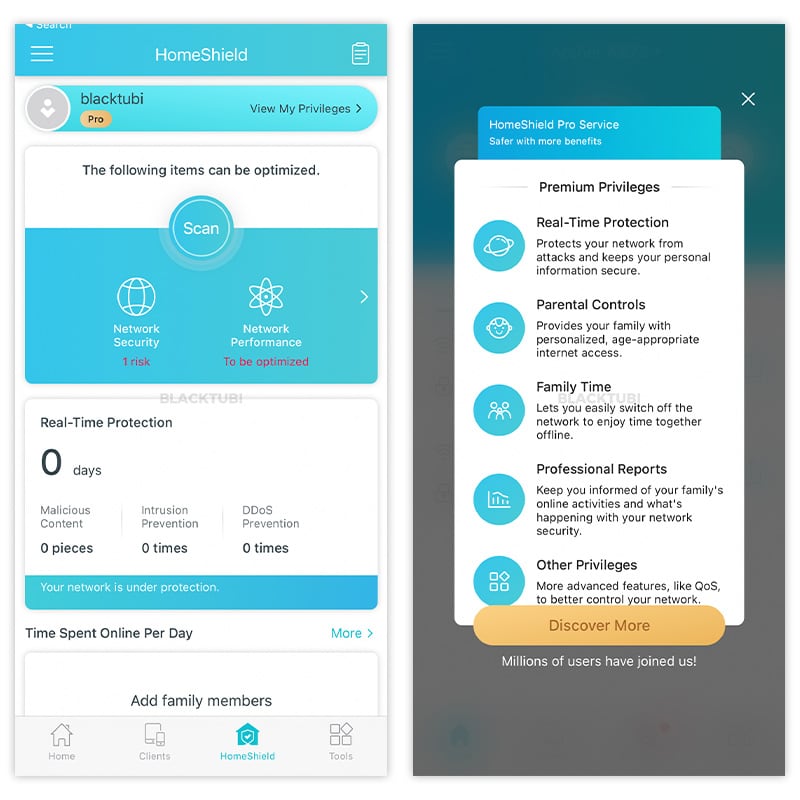
It also added protection for smart home and IoT devices. Considering these devices rarely receive firmware updates, having extra protection is certainly helpful. TP-Link claims it can protect an insecure device from being used as a loophole to launch attacks on your home network. We have no way of verifying these claims.
HomeShield Parental Control
TP-Link new HomeShield parental control is also much smarter than before. It can perform content filtering by category and usage time limitation. The categories are more comprehensive covering more websites than before. Based on our testing on some known sites, it is certainly more effective than HomeCare and other similar systems that we have tested on other brands.
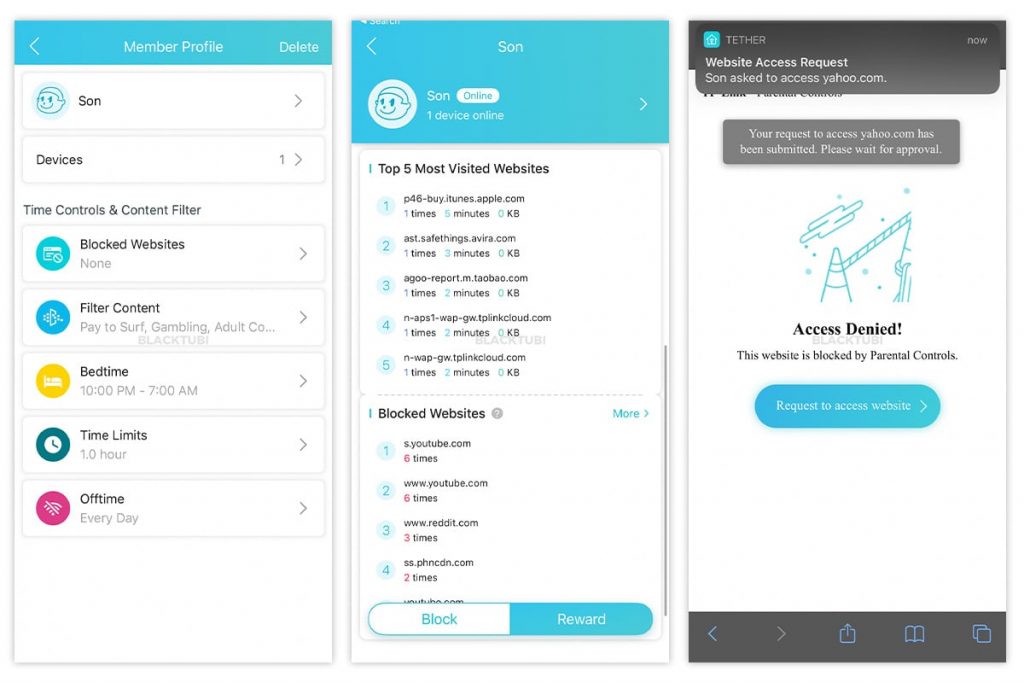
What’s so great about the new parental control is the ability to display usage charts and web history. It will show the top browsed website and attempts to access a blocked website by each user. If a page is blocked by the parental control feature, the user can request for access in which the admin can approve it via the TP-Link Tether app.
However, the upgraded HomeShield feature is not fully free. The Free tier only comes with the basic firewall without the advanced malicious content filtering feature. It also does not provide the comprehensive reporting of the parental control feature. More details available on TP-Link website here.
TP-Link HomeShield feature is a really robust parental control. While TP-Link provide a 30 days free trial of the Pro tier, it will cost RM24.90 per month after the trial has ended. I am fine with a subscription based business model but I find the price is too much.
OneMesh Capability
For those staying in a bigger home, it’s possible to link the Archer AX73 with a OneMesh extender. The OneMesh extender will then work together with the Archer AX73 resulting in a stronger WiFi coverage with true mesh WiFi features like seamless roaming and band steering unlike a traditional WiFi extender.
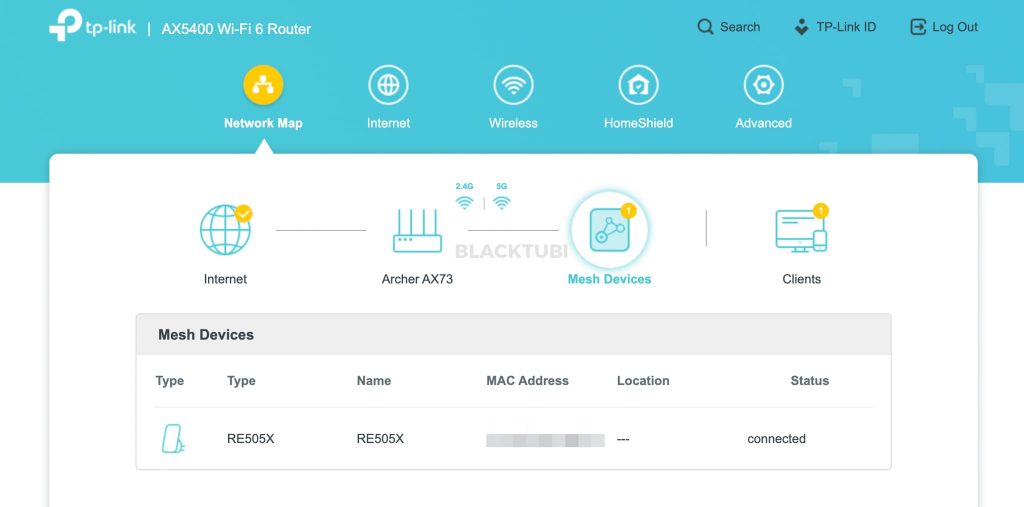
For the Archer AX73, I will only recommend linking it with a WiFi 6 OneMesh extender such as the RE505X and RE605X. Unfortunately, TP-Link does not allow router to router OneMesh currently. You also cannot link the Archer AX73 to a Deco Mesh WiFi system directly as they are based on a different technology.
Closing Thoughts
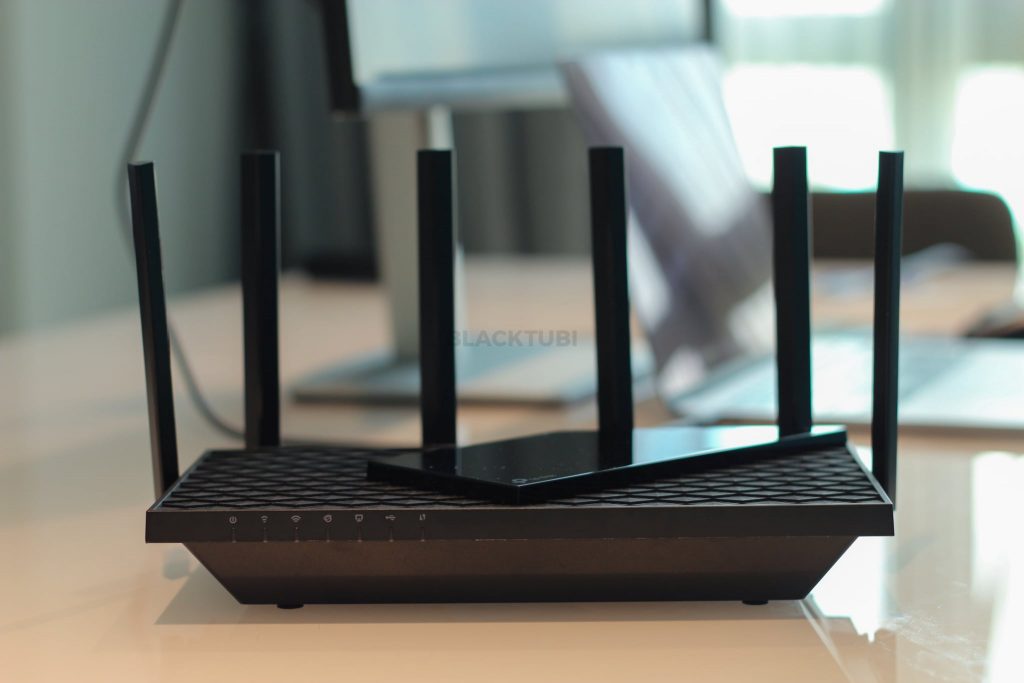
At RM399, the Archer AX73 offers really good performance even when comparing to some other routers that cost twice as much. It offers really good 5Ghz WiFi coverage and very fast WiFi speed on the 5Ghz channel with 160Mhz. Coupled with a fast 1.5Ghz Triple-Core CPU, it is a really good product from TP-Link.
TP-Link software is also smarter than before with a robust class-leading parental control feature. TP-Link is committed to provide more security to smart home and IoT devices with the new HomeSuite security suite. WPA3 security is also supported right out of the box.
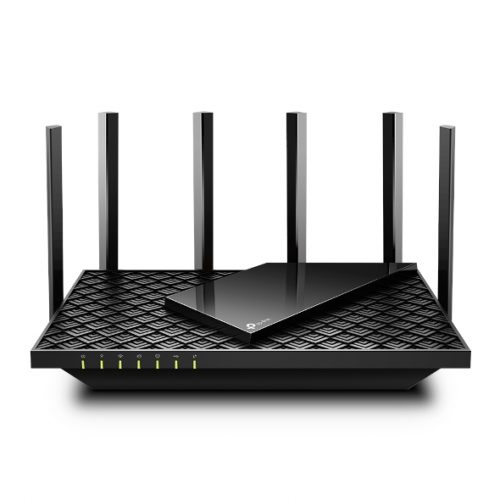
TP-Link Archer AX73
9.2
Tubi Rating
pros
- Premium performance at affordable price
- Robust HomeShield parental control solution
- Stable and reliable software
- Good security
CONS
- Advanced HomeShield features require a subscription
- Limited OneMesh support

For this if i want to make it mesh, I need to have 2 units right?
You can only mesh 2 units if you have the latest Archer AX73 V2 version. The V1 version does not support EasyMesh.
Archer AX73 V1 (US) should have EasyMesh real soon, the EU V1 version has just received the new firmware supporting it.
Hello, I’m planning on upgrading my home’s internet setup and I am using Unifi with the following devices: – Basic Router that the ISP gave – Powerline Extender (TL-WPA8631PT) for personal ethernet usage – Wi-Fi Extender (TP-LINK RE220) for general family usage Thinking of replacing the basic router with this AX73 and the Wi-Fi Extender with a Mesh Extender but have some questions on a potentially better setup: – Would it be better to go with a Deco Mesh setup, replacing both the Basic Router and Wi-Fi Extender? – If I go with the Deco Mesh, would the Powerline Extender… Read more »
Well it depends on what is your goal and what is your performance target. Using a full Deco system will offer better seamless roaming across the whole coverage area. The Deco should be able to automatically detect the powerline Ethernet backhaul but I believe even Deco on wireless mode should be faster than powerline these days.
Powerline is only approximately 200Mbps on best case scenario but a high end Deco like the Deco X95 or XE75 can perform up to 600-700Mbps.
Currently got AX72…..Found another used AX73 in market…If setup router+mesh…Can I use AX72 as main on 1st floor and AX73 as mesh at ground floor as I need wider coverage? Or the other way round?
It doesn’t work that way without EasyMesh feature.
Archer AX73 V1 (US) should have EasyMesh real soon, the EU V1 version has just received the new firmware supporting it.
Hi , ypu say 2 antenna are for 2.4 ghz and 4 for 5 ghz, what 2 antenna are for 2.4 and what 4 for 5ghz ,?
I labeled them in the teardown photo. Perhaps you can have a look again if you missed that. The antennas should be fully upright for the best performance.
Is AX-73 model backwards compatible for other protocols, like the 802.11AC/a/b/g/n. I have very less wifi-6 compatible devices, however would like to use this router to upgrade from the existing routers and gain high speed and reliability
Yes, it’s backwards compatible with 802.11ac/b/g/n. Not sure about 802.11a as I do not have a device to test.
Hi. Would the AX73 offer better speed/range than the AX55 with 2 walls between. I have a 400mbs connection.
Found a deal for factory refurbished AX73 with 1 year warranty for same price as new AX55 with 3 years warranty.
Is it worth getting the AX73.
Appreciate your input
Yes, the Archer AX73 is better than the Archer AX55
Thank you
Hi, great review. I’m currently using 4 TpLink Deco M5 in my house, which 1 as a router and the other 3 as an access point. However, i feel that the M5 does not work as well as a router and i am planning to buy the TpLink Archer AX-73 as a router and then configure the rest of the M5’s as access point. Is this doable? Or rather will this be a good setup?
Thank you so much and keep up the good work.
I will suggest sticking back to the Deco series. Once you turn them into access points mode, the amazing backhaul management doesn’t seem to work as well. If you need something with higher processing power, the Deco X50 can be considered.
Hai admin. This router can support 5 fix ip unifi? If support, how to set?
Unfortunately, for fixed IP, you are stuck with TM’s own router.
Good review AX73!
As I want to buy AX73 I notice that there are three hardware versions : v1.0, v2.0, v2.20
Does you know what is the difference between three hardware version for Archer AX73 and what is the improvement?
Thanks.
Not really sure what’s the exact hardware changes but TP-Link told us that they are minor changes that shouldn’t impact the performance. They probably have to do small component changes previously due to COVID related supply chain interruption.
Thank for your reply.
I also see the previous comment above, you say that they changed the 5GHz Wi-Fi chip from BCM43684 into a newer BCM6715 chip from Broadcom in hardware version 2.0.
Is that true? It means that BCM43684 chip not supply anymore?
That’s a possibility since other brands are also swapping BCM43684 into BCM6715.
I got the AX73 ver2.0, and I noticed that the power is “12v – 2.0A” compare to ver1.0 is “12v – 2.5A”.
Maybe tp-link really change the chip.
Hi blacktubi, thanks for the review. For the 2 wall performance test using ax73, u were on a 800mbps internet plan and got about 500mbps download speed. If u were on a 500mbps internet plan instead, would the 2 wall test still give u about 500 Mbps speed? Or would it theoretically be around 300mbps instead? Thanks
You will still get around 500Mbps speed as that is the WiFi performance that’s still attainable from that distance. However, bear in mind that your mileage may vary depending on the test device you use and the layout of your home.
Noted with thx ?
Hi blacktubi, I got the ax73 already, so far so good on the wifi aspect. But, any idea how to connect a landline phone? I’m on maxis broadband, the ax73 doesn’t have a tel port, and the modem tel port doesn’t work when I connect the phone to it ?
Unfortunately, the Maxis landline phone only works with the original router. There’s not reliable solution available out there.
Noted on that thanks. Looks like after maxis contract completes, gotta change to unifi. Any suggestions what I can do for now to get landline running and ax73 for wifi? I’ve been reading up, some were talking about accessing the modem to enable phone line direct from modem tel port (too technical for me). or modem lan 2 to ax73 wan, then ax73 lan4(voip) to maxis router wan, then tel line to maxis router (tried this but no sound at all lol. Not sure is it cuz I need to do some setting changes to maxis router?). Or modem lan… Read more »
You can try to explore whether the current Maxis router supports bridging which let you to use the AX73 on PPPOE mode. That’s probably the easiest option out there.
Apart from that, trying to obtain the VOIP profile and gaining access to the modem and install it over there is pretty hard. Most modems from TM are fully locked down without any configurable settings for normal users.
Thanks, I’m buying the AX73 V2.0 tonight so I’ll see what the device is really like!
Cheers and good review AX73!
As I want to buy AX73 I am wondering if you actually know what is the difference between the hardware version V2.0 and V1.0 for Archer AX73, are the same CPU and amount of RAM in both versions, and what is the improvement?
Thanks.
Unfortunately, I do not have access to the v2 hardware version. However, based on TP-Link’s FCC filing, they changed the 5GHz Wi-Fi chip from BCM43684 into a newer BCM6715 chip from Broadcom. The CPU and RAM are similar.